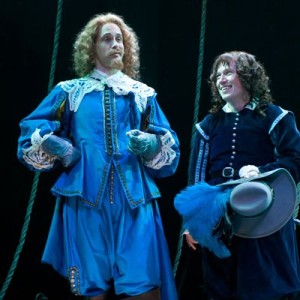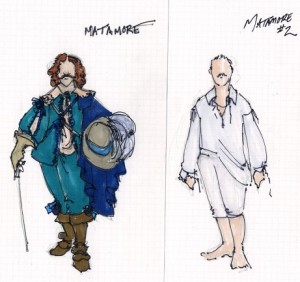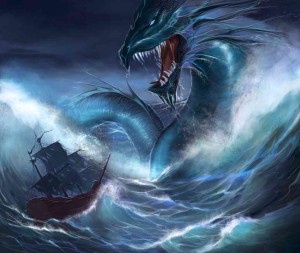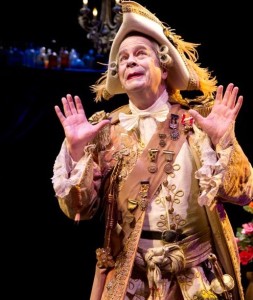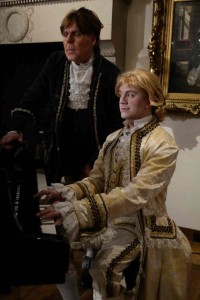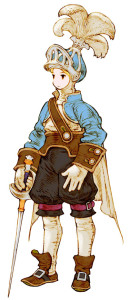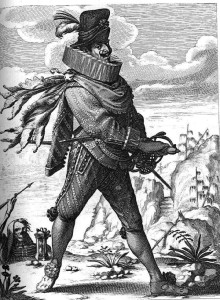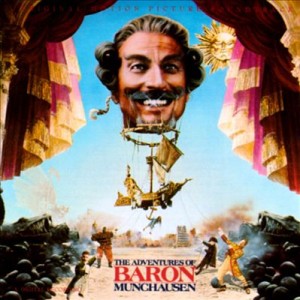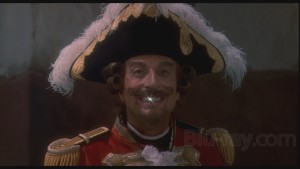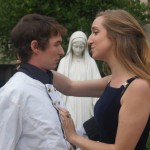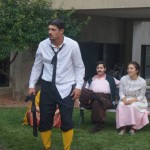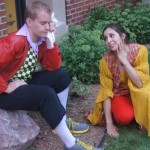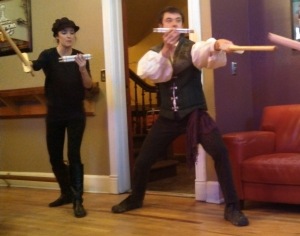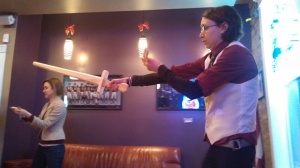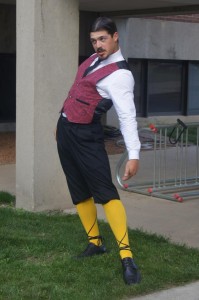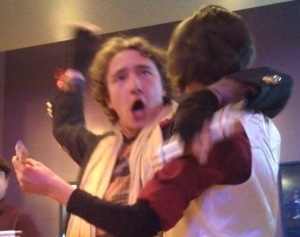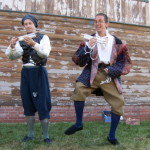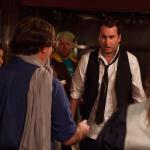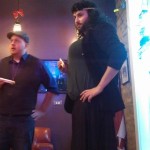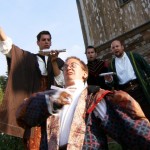Chapter the 3rd
He was both unseen and unheard, but he could hear them. Neither the musician plucking away in the far corner nor the trio of ancient drunkards whining and wailing of the golden past could drown out these two, seated at the bar as they were. Sally, the barmaid, grunted and huffed as she wiped out the glasses, sighing and humming and generally doing everything in her power to eject the late-staying patrons, whose profitability had long since dissipated. She did everything short of actually speaking, at least. Passive-aggression was a family tradition for Sally, and she found that thinking bad thoughts was often more effective than the direct approach. After all, when she’d heard that burk Beacons would be stopping by, she groaned and rolled her eyes, and here they were but an hour or two from sunup, and Beacons was no show. Yes, Sally’s inarticulate complaints were assuredly an effective deterrent.
Yet even she could not drown out this conversation. He was both unseen and unheard, but he was attentive.
“Seems a shady business to me,” Byuker remarked. The eavesdropper could almost hear the clicking of the officer’s newly-purchased teeth, financed no doubt by the plundered wealth of dozens of renters, fencers, and other defenseless marginalia that populate the edges of society. His large leather belt creaked each time Byuker adjusted it, which was frequently. “Sounds to me like the sharper thing to do would be to clap you in irons and smash up your whole operation.”
“If you could find it,” the other, less familiar voice objected.
“Ohhhhh I’d find it. This here face is good for more than just charming the ladies.”
At this, Sally offered a near-deafening hum of skepticism, but Byuker continued unabated.
“This here face houses the sharpest military mind in the city, if not the nation. I’d bloodhound your lot out in a matter of hours, if not minutes.”
“I don’t doubt it,” the other practically cooed. “So what keeps you from doing so?”
“Profit!” Byuker guffawed. “I could use a new uniform to compliment my well-waxed mustaches, and these boots, while good enough to drink in, have been more than a little soiled by the night’s festivities.”
By ‘festivities,’ the eavesdropper was quite certain Byuker meant another raid on another batch of defenseless nobodies. Possibly the carnival that had just opened not a stone’s throw from the pub.
“Profit you shall have,” the voice assured him.
“Well then… What was your name again?”
“Citron.”
“What a sweet name,” Byuker condescended, with no apparent irony. “Well then Citron, all that remains is to discuss my fee.”
“I would still like to speak with your partner, Officer Byuker. This is a delicate operation, and I should like to have my options readily clear.”
Seats creaked, and the eavesdropper was certain that Citron had just evaded a well-meaning strike from Byuker’s notoriously free arm. Byuker never so much as slurred, no matter how drunk he became, but he often claimed his aim was improved by a brace of pints. In truth, his aim was abysmal regardless.
“Never you mind Beacons. A fine lad, but he’s enslaved to that wife of his, if you follow. Loyal as a dog, but subtle as one as well. Can’t be relied on for soup.”
“He is rather late,” Citron agreed. “Very well. Stop by this address sometime tomorrow evening and I shall introduce you to your subordinates. We can settle your bill there.”
“Subordinates!” Byuker crowed. “Haven’t enjoyed any subordinates since I was head of my old school gang, unless you count Beacons of course.”
Several times, Byuker loudly slapped what sounded to be Citron’s shoulder. The eavesdropper could almost hear the strange man wincing. “Good evening, then.”
Citron rose from his stool, and soon after the sound of his departure was heard.
For just a blessed moment, Byuker was silent. The eavesdropper looked up from his perch beneath the back of the bar, shuddered behind a small latticework coverlet, ensconced with a trio of ancient wine bottles. Through the latticework, he could spy Sally tromping about, making an almost musical production of cleaning mugs for the third time and wiping down the bar for at least the eighth. “Gettin’ quite late,” she observed in her rolling alto, ostensibly to no one in particular.
“It is, at that,” Byuker agreed emptily. “So late, though, reckon I’ll make an evening of it. Does Greta still work the streets down Pooler Avenue?”
“She’s surely engaged at this hour.”
“Good point.” Byuker slapped something on the bar; his pay, presumably. “Time for another raid, then. Greta’s a favorite. Probably working at her place, wouldn’t you think?”
“You know her better than I,” Sally sneered.
“Right. Well.” The eavesdropper heard Byuker’s substantial weight lift from the stool, followed by another adjustment of his belt. “Right!” he shouted to the bar at large and, judging from his volume, the entire neighborhood. “It’s entirely too late for you lowlifes to be dragging about here. Out into the street with ya!” There was a lot of shuffling, a few meager complaints, and far more strikes of a baton upon heads, but eventually the pub was evacuated and Byuker offered his farewell.
It was scarcely a minute before Sally had snuffed all the lights and retired to her back room. Five more minutes blessed the eavesdropper with her elephantine snores. Finally, it was time.
Aching all over, he reached with his left hand to press, shake, and force the ancient latticework door open. It squeaked on occasion, and the eavesdropper would have to wait and ensure that Sally’s snores continued before returning to work. When the door was finally opened sufficiently, he began unfolding himself out of the small storage space, being careful not to clink any wine bottles together. Once he finally escaped his confines, he collapsed onto the floor behind the bar and rested, allowing his dry and strained muscles to relax. His every extremity was numb and cramped, feeling as though a thousand pin-footed ants were crawling all over his arms and legs.
As he lay nearly gasping on the floor, rubbing his tingling arms with his tingling hands, the front door jostled. The eavesdropper continued to inhale like a beached fish, certain the door was merely being accosted by an angst-ridden drunk. He was disabused of his hypothesis, however, when some clicks heralded the slow creaks of an opening door.
Lamentably, he held his breath. He froze. He listened.
Painfully small feet were heard creeping along the floor. Whoever owned those feet was no stranger to dark and foreign places: the feet traveled with remarkable patience, evading discarded peanut shells, broken glass, and most likely even sticky beer stains. Not once could the feet be heard to strike a single errant object nor pry themselves from an adhesive floorboard. It was only by lying perfectly still and paying special attention, closing his eyes to avoid distraction, that he was able to hear these feet at all.
The feet were moving unmistakably toward the bar. Did their owner break in merely to swipe a pint?
Perhaps this remarkably cautious individual had naive aspirations of gutting the till, which Sally had of course emptied before retiring.
Straining his ears to the utmost, scrunching his eyelids in concentration, the eavesdropper heard the feet stop just before the bar. He was reasonably certain a hand or two had come to rest on the bar itself.
Then, there was a slight yet staccato creak.
The eavesdropper threw open his eyes just in time to see a dark mass flying over the bar and plummeting down toward him. He tried to roll away, but there was simply nowhere to go, and he managed only to expose his still-numb arm to ninety pounds of elbows and knees that came crashing down upon him.
Tellingly, neither individual let out a cry.
In an instant, the intruder was off him and had pressed himself to the farthest end of the bar. The eavesdropper, flopping like a fish, managed to get himself up on his haunches. Each stranger had formed a mirror image of the other, trying to bludgeon the dark into submission with their stares, and make out some detail of their unexpected adversary.
In time, the shadowy interloper resolved into long, straight hair, boney limbs, and a pair of bright, wide eyes, dark irises housed within them. Nothing else was yet visible.
He knew he was the weaker party, and surely the intruder knew this as well. Any attempt at escape would surely prompt an attack. The intruder did not appear much larger than himself, perhaps even a little bit smaller, but there was still not predicting what the creature was capable of.
The eavesdropper dared to open his mouth and whisper. “I mean you know harm,” he exhaled, very much sounding like a breeze.
He could just make out the intruder’s nod. A thin, almost pointed chin wagged slightly as the intruder hissed, “I need a cloth, and some water.”
“There’s a candle behind you on the bar. I’ll fetch the matches.”
He reached back into the latticed recess. He knew the pub almost entirely by memory now, having studied it from various vantage points over the week, but before his fingers could close on the matches, a tiny and vice-like arm wrapped around his throat.
“Treacherous swine!” the sharp-chinned shadow hissed. “What are you planning?”
He shrewdly resisted the urge to shriek, and in a measured voice said, “Nothing, nothing. The matches are in here.”
“There was no candle!” The shadow as spitting flecks of bilious saliva into his ear. “What have you got hidden in there; a knife?”
“Nothing! I’m telling you the candle is up there.”
“Then why–”
Just then, they heard the unmistakable rasp of a match being struck. A faint glow appeared, and he risked turning his eyes to peer behind him.
The shadowy stranger stood. With an arm still wrapped around his neck, the eavesdropper was forced to stand as well. The stranger turned, rotating him in the steely grasp.
Standing before them was not Sally the innkeeper, but a child of not quite adolescent years. His immense bifocals drew they eye from the mass of freckles and a dirty mop of blondish hair. His remarkably round head rested on a thin neck and a portly body, draped in what appeared to be forest-green tweed. All in all, he appeared to be a tiny businessman with a prominent overbite.
The stranger’s voice rasped in his ear, “Who are you?”
The bifocals served to disguise more than amplify his eyes, but the boy seemed to be cautiously evaluating them both before answering in a normal speaking voice. “You’re here for the book, yes?”
There was a pause.
“What book?” the voice rasped.
“There’s no need to whisper,” the boy assured them, underscored by Sally’s perpetual snores. “That woman is as sound as a comatose crocodile.” There was another pause as the boy looked over the shadowy stranger. “You could use a wash.”
The eavesdropper looked down as best he could. His attacker’s arm was bathed up to the elbow in blood. He tried, unsuccessfully, to repress a gross shiver. The boy tossed a filthy cloth toward them, and the stranger’s hands moved to catch it. Instantly, the eavesdropper collapsed to the floor and rolled away. Before he could get to his feet, however, the stranger tackled him and held him down on the floor, fixing him with a furious glare.
“You’re a girl!” he nearly shouted.
The boy cleared his throat. “Well there’s no need to holler about it.”
The girl, her arms pasted in gore, fixed a gimlet eye upon the eavesdropper, then released him and stood. In a moment, all three were on their feet looking each other over.
No one was over the age of twelve.
The girl was in tatters. While his own rags were the result of many years under scant conditions, the girl’s poor habiliments seemed more the result of recent distress. Taking note of her complexion, he concluded aloud, “You’re one of those gypsy people.”
The boy and girl shared a glance. “Seems quite a fan of staggeringly obvious statements,” the boy offered, “doesn’t he?” Despite the situation, the boy seemed completely at ease, a confident and almost friendly smile upon his face. “My name’s Cecil, by the way.”
When she finally spoke aloud, the girl’s femininity seemed obvious. Her voice was deep for her age, but unmistakably a girl’s. “My name’s Dragon Breath.”
He could almost see young Cecil rolling his eyes behind the candle-fogged glasses. “And you, young man?”
His glance flitted back and forth between Cecil, the tweed-bound peanut of a boy, and Dragon Breath, the bloody-clawed falcon of a girl. “I’m Lion Heart.”
“Are not!” the blood-spattered girl exclaimed.
“Am too!”
“Nuh uh!”
“Well you’re not Dragon Breath!”
“Am so!”
“Are not either!”
“Enough!” The freckled, bespectacled boy had evidently decided he was in charge, and Lion Heart the cramped thief-boy had no real objection. “Here’s a bottle of seltzer, young lady. It should help clean off those incriminating stains.”
“Who’s a young lady,” sneered Dragon Breath. “I’m older than you.”
Cecil made quite a show of adjusting his glasses. “Those two notions are hardly exclusive. Clean yourself or not; it’s not concern of mine.” He cleared his throat again, daring either child to offer further objection. Lion Heart offered a half-rolled pair of eyes toward the girl, assuring his portly new friend that they both knew who the real baby was here.
Cecil continued, “Am I to sincerely conclude that neither of you is here for the book?”
“I just wanted to wash my hands.”
A pause. Two pairs of impolitely curious eyes turned to young Lion Heart. In response, he merely shook his head.
“Well then,” Cecil concluded, “leave me to my business, and I shall leave you to yours. Good evening. I suggest you both take the utmost caution. The trullious barmaid is a heavy sleeper, but even she has her limits. The proverbial word, above all else, is ‘mum.'”
At that precise instant, a crash unlike anything they had ever heard burst radiated all around them. The ground shook, the front door burst open, and the windows shatter. Cecil’s candle was rendered moot by a warm, red glow from outside that now filled the pub.
The vibratory aftershocks of the crash were underscored, incredibly, by Sally’s snores.
In an instant, Dragon Breath leapt over the counter and flew out the front door. Lion Heart nodded to Cecil and copied her exit.
Or at least he tried. His still numb arms betrayed him, and all he managed to do was hop a bit and collide with the bar. Then slowly rolled over it and collapsed on the other side. “Oof,” he said, unenthusiastically. Soon enough, he was on his feet and gone.
Cecil eyed their departure and shook his head, presumably for no one’s benefit but himself. Remarkably, Sally’s snores continued. Abandoning stealth entirely, the round boy toddled over and knelt before the very recess in which the alleged Lion Heart had spent his evening. Cecil marveled that a hungry boy, even one so much thinner than himself, was able to fit in such a snug location. Peering inside with his candle, he found three corked bottles, a few nails, scraps of paper, and two things of particular interest.
The first was a tiny lever. Made of copper and no larger than his own generous pinky finger, the lever was wedged up into the very farthest corner of the small recess. At its top was a small bulb, and printed just barely visible on the front-facing side of that bulb was a small skull. Printed, Cecil knew, on the other side, would be a small plus sign. This indicated that the lever was to be pulled toward the viewer, rather than pushed away.
The second thing of particular interest was a particularly small mouse, which until very recently had been chewing on one of the corks. It was now turning to look at Cecil and, upon spying the boy, offered a meager but piercing cheep.
Instantly, a cacophony of snorts was heard nearby, followed by a middle-aged woman’s voice crying “Huh, what? Who’s there!”
“Oh, come on now,” Cecil moaned, evidently to no one. Acting quickly, he tugged on the tiny lever, which revealed a small false flooring in the recess. He lifted the false flooring, carefully removing the insubstantial book beneath it, then reset the flooring and lever. Deciding to place forethought before bravado, and being well aware of the limitations of his body, Cecil elected to eschew leaping over the bar in favor of crawling beneath the pass-under. He then scrambled to his feet, slipped the book into an inside pocket, and strode outside.
Once outside, the boy was met with a sight that froze him solid.
